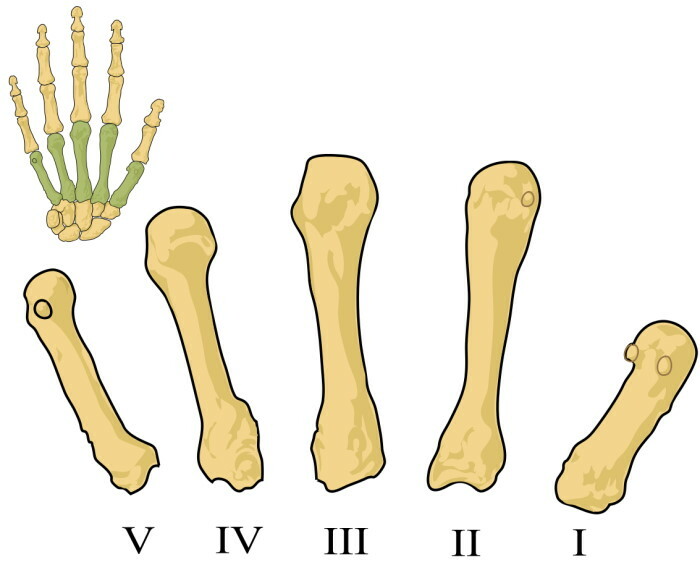Content
- Classification
- Adaptive
- Behavioral
- Emotional
- Teenage
- Climacteric
- Fatal family
- Paradoxical
- Psychogenic
- Idiopathic
- Medication
- Organic
- Causes
- Treatment methods
- Drug therapy
- Folk remedies
- Possible consequences and complications
- Psychological consequences
- Physiological consequences
- Sleep deprivation videos
WITH everyone faces a lack of sleep third person. And this is not surprising, since a large number of tasks must be completed in a day. There is no time for good rest. Insomnia can be caused not only by physiological circumstances, but also by pathological processes. Chronic sleep deprivation can lead to serious consequences and health problems. Therefore, it is necessary to devote enough time to rest at night.
Classification
In medicine, sleep deprivation is classified according to provoking factors and associated symptoms.
| Name | Description |
| Primary insomnia | The main reason for lack of sleep is physiological characteristics (improper daily routine, lifestyle, age of a person and individual characteristics of his body). |
| Secondary | Lack of sleep is provoked by various pathological processes, including mental disorders, diseases of internal organs and systems. |
There are also certain degrees of sleep disturbance:
| Name | Description |
| Easy | Sleep disturbance is mild and rarely manifests itself. |
| Average | Sleep deprivation symptoms bother the person more. |
| Heavy | A person does not get enough sleep every day, against the background of which health problems appear. |
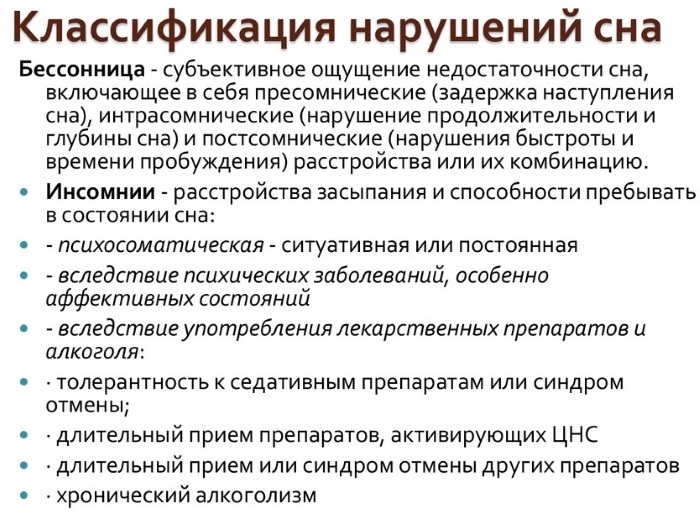
Lack of sleep is also distinguished taking into account provoking factors.
Adaptive
Sleep in a person is disturbed as a result of changes in the usual routine and rhythm of life. This can be a change of job, place of residence or school, even a change of bed. When a person gets used to new conditions, sleep will recover on its own.
Behavioral
A type of sleep deprivation that is more common in young children. They get used to falling asleep under certain conditions (during breastfeeding or in their mother's arms). In the absence of these factors, it is difficult for a child to fall asleep.
Emotional
Lack of sleep provokes strong feelings, emotional outbursts or mood swings. It can be family conflicts or disagreements at work, illness, death of a relative, expectation of an important event.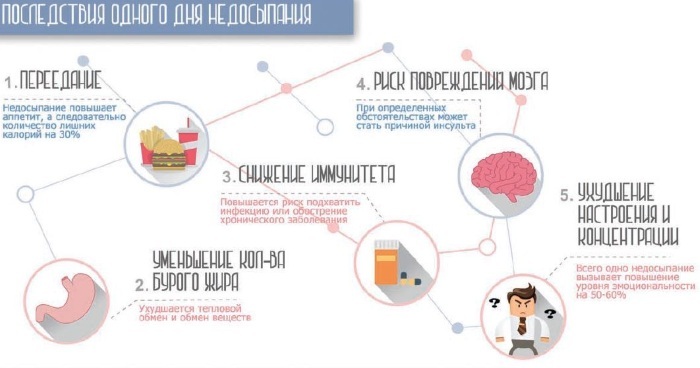
Emotional sleep deprivation in children occurs due to active games before bedtime. The same goes for rich films or cartoons.
Teenage
In adolescents, sleep deprivation is more often the result of hormonal disruptions in the body. The psyche of young people is more susceptible to emotional influences than in childhood. Insomnia in adolescents occurs against the background of strong experiences at school, after a long time on the Internet or before an important event. The same goes for unhealthy eating habits when young people abuse unhealthy foods and energy drinks.
Climacteric
Sleep deprivation, which often occurs in women with the onset of menopause. The production of hormones decreases, against the background of which magnesium is less absorbed, which is necessary for relaxation. Psychological problems also provoke climacteric insomnia, since during menopause a woman feels lonely and unnecessary. It is recommended to consult a neurologist to prevent unpleasant consequences.
Fatal family
Hereditary pathology that is transmitted at the genetic level. In the part of the brain that is responsible for normal human sleep, specific plaques are formed. They not only interfere with normal sleep, but also provoke panic attacks in a person. In difficult situations, the patient's death occurs, since even the most potent drugs do not help sleep.
Paradoxical
Pseudo-insomnia, which is characterized by impaired sleep perception in a person. It seems to him that he has not slept all night. The diagnosis and treatment of paradoxical sleep deprivation is the responsibility of a neurologist or psychologist.
Psychogenic
Sleep disorders are provoked by mental illness (phobia, depression, psychosis, schizophrenia).  Concomitant symptoms are persecution mania, the appearance of hallucinations and nightmares. In this situation, treatment involves addressing the underlying cause of the lack of sleep.
Concomitant symptoms are persecution mania, the appearance of hallucinations and nightmares. In this situation, treatment involves addressing the underlying cause of the lack of sleep.
Idiopathic
Even medical professionals cannot determine the root cause of sleep disturbance. A person is completely healthy, but at night he cannot sleep, he constantly wakes up, and in the morning he feels tired and overwhelmed. In some situations, it can be a hereditary disorder or the result of mental disorders.
Medication
A secondary type of sleep deprivation that occurs while taking certain medications (hormones, nootropics, oral contraceptives, psychostimulants).
Organic
Insomnia is provoked by various pathological processes (heartburn, osteochondrosis, gastritis, tachycardia). There are also accompanying symptoms in the form of painful sensations and discomfort. In this situation, the patient needs a comprehensive diagnosis in order to differentiate the disease and provide treatment.
Causes
Lack of sleep and its consequences in most cases are due to an incorrectly distributed day. A person sits up at the computer for a long time, parents do their homework with children until late, household chores are done after a working day. Numerous reasons are also provoking factors.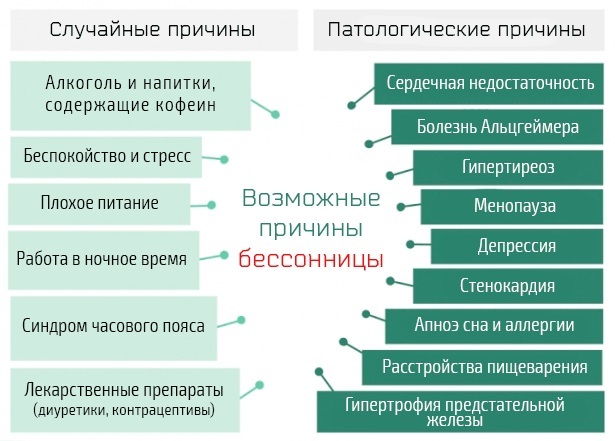
It all depends on the age of the person:
| Category of people | Causes of lack of sleep |
| Small children |
|
| Pupils |
|
| Adults |
|
| Pregnant women |
|
Improper nutrition, damage to the central nervous system also provoke the development of chronic lack of sleep. The pathological condition is accompanied by characteristic clinical symptoms that will help to timely identify abnormalities in the body and take action.
Treatment methods
You can get rid of lack of sleep if you get enough sleep. In this case, you need to go to bed before 23 o'clock. It is also recommended to set up a daily routine individually. If the cause is illness, it is important to visit a doctor and get tested. Comprehensive diagnostics will help differentiate pathology, according to the results of which a neurologist or psychologist will select the most effective therapy.
Drug therapy
The specialist selects medicines, taking into account all the features of a person's condition. It is important to strictly observe the dosage, since many drugs have side effects.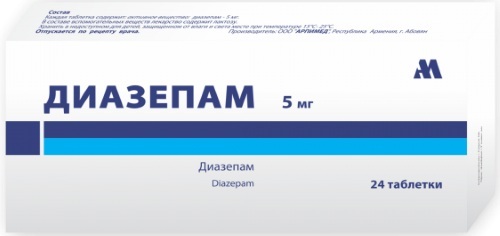
| Drug group | Name | Application |
| Sedatives | Persen, Novo-Passit | Herbal medicines help you relax before bed and fall asleep. Adults are prescribed 2-3 tablets 2-3 times a day. |
| Hypnotics | Diazepam, Zolpidem | Medicines have a sedative and anti-anxiety effect. The adult dosage of the drug depends on the patient's condition and is 2.5-10 mg 2-4 times a day. The course of treatment lasts a maximum of 2-3 months. |
| Daytime tranquilizers | Mebikar, Buspirone | The medicine is swallowed whole, not chewed and washed down with a sufficient amount of water. An adult is prescribed 0.3-0.9 g 2-3 times a day. The average duration of therapy is 2-3 months. |
| Antidepressants | Trazodone, Mirtazapine | The starting adult dosage is 100 mg. The medicine is taken every day before bedtime. The dosage, if necessary, is increased by 50 mg every 3-4 days. |
Additionally, patients are advised to take vitamin complexes that will help replenish the stocks of missing trace elements.
Folk remedies
Unconventional methods of healers and healers can also be used for insomnia, but a prescription should be selected with a neurologist or psychologist. Many natural ingredients can trigger allergies or individual sensitivities.

| Name | Recipe | Application |
| Dill | Pour 1 tbsp. seeds with boiling water (1.5 tbsp.). Leave for 1 hour and strain. | The resulting solution must be taken orally 2-3 times a day for 2 weeks. |
| Peach flowers and roses | Pour 100 g of peach flowers and 400 g of roses with hot water (1 l). Insist the resulting mixture for 30 minutes and strain. | The finished broth is added to a warm bathroom. Water procedures take 20-30 minutes. |
| chamomile | Brew 1 tbsp. dry herbs with hot water (200 ml). Insist 15 minutes and strain through cheesecloth. | The finished drink is recommended to be consumed before going to bed for 7-10 days. |
Before going to bed, you can drink warm milk with the addition of a small amount of ghee or natural honey.
Possible consequences and complications
Sleep deprivation and its consequences develop gradually. At first, a person does not notice violations, then accompanying symptoms appear, which are important to pay attention to. Otherwise, unpleasant complications await him. Chronic lack of sleep provokes the gradual destruction of brain cells. The failure will affect all systems of the human body.
The predicted consequences of sleep deprivation are divided into certain groups, depending on the factors that result in sleep disturbance. The environment and the person's age also matter.
Psychological consequences
Prolonged insomnia leads to the fact that a person does not get enough sleep, becomes irritable and shows apathy towards the world around him. Concentration of attention is impaired, clumsiness appears. In the absence of therapeutic action, the pathological condition progresses and negatively affects the human psyche.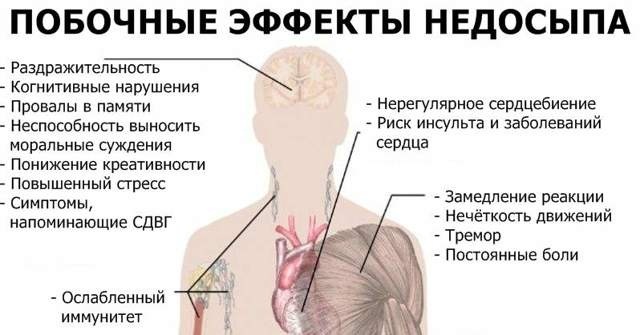
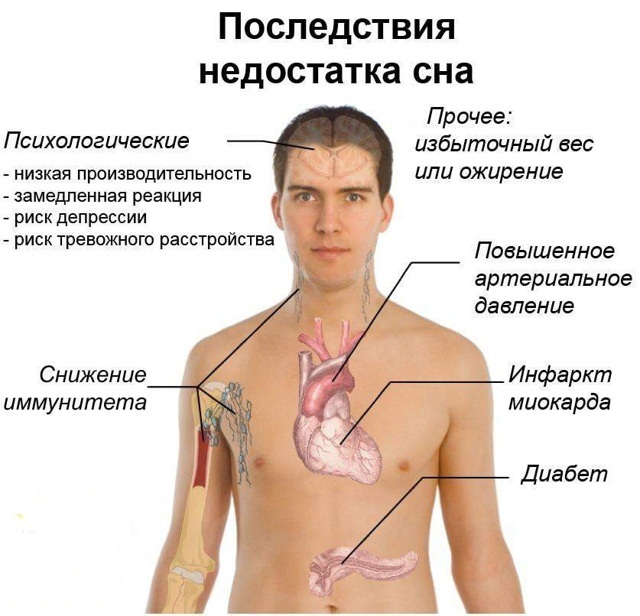
Complications of insomnia:
- reaction slows down, concentration worsens;
- for men, lack of sleep entails problems with potency;
- productivity decreases (a person cannot fully cope with everyday affairs);
- there is not only a breakdown, but also irritability for no apparent reason;
- the likelihood of developing serious depression, schizophrenia increases;
- positive emotions are replaced by negative thinking;
- memory deteriorates;
- emotional lability is more pronounced;
- in some situations, hallucinations occur;
- panic attacks appear, during which a person has suicidal thoughts, a desire to hide from the whole world;
- insomnia also causes problems in your personal life, which is manifested by a deterioration in sex drive.
Lack of the right therapy or other actions to correct chronic sleep deprivation will lead to the fact that the problem is exacerbated. At the initial stage of sleep disturbance, it is enough for patients to adjust their lifestyle and adhere to simple rules for preventing complications. If there is no result, then the patient will need to consult a psychotherapist.
Physiological consequences
Lack of sleep and its consequences are dangerous not only for psychological problems. Chronic insomnia negatively affects the work of the whole body from the inside. Disturbed sleep provokes a malfunction of metabolic processes, physical exhaustion. People who sleep little and poorly are more likely to get sick, after therapy they recover for a long time. The human body poorly assimilates food and all the trace elements that it receives.
Lack of sleep and its physiological consequences:
- Hormonal disorders due to a malfunction in the functioning of the endocrine system.
- Reduced life expectancy. Inadequate rest at night leads to premature aging of the body. The skin becomes dry, wrinkles appear earlier on the face.
- The likelihood of developing malignant tumors increases. This is because the lack of sleep decreases the production of melatonin.
- Decreased visual acuity. Insufficient nutrition of the optic nerve leads to the development of optic neuropathy.
- The likelihood of damage to bone structures is also high.
- The aging process as a result of lack of sleep is exacerbated by chronic fatigue. This is also facilitated by the increased production of the hormone cortisol. He is responsible for elastic skin.
- Chronic insomnia provokes an increase in appetite and a decrease in the feeling of fullness, as the production of ghrelin is increased. In the same period, the concentration of leptin decreases.
- The person also runs the risk of facing cardiovascular disease. Lack of sleep leads to an increase in blood pressure, which entails the development of heart attack, stroke, arrhythmia.
- As a result of a malfunction of the endocrine system, the risk of developing diabetes also increases.
- Decreased reflexes will affect motor coordination.
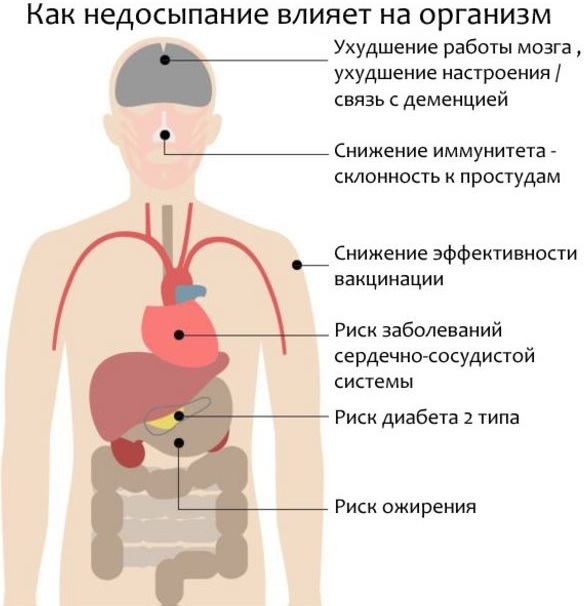
Chronic insomnia is accompanied by drowsiness throughout the day, a person constantly yawns, his state of inhibition. Headaches also appear, which indicate an increase in intracranial pressure. A low concentration of cytokines leads to a decrease in the defenses of the human body. A weak immune system is unable to cope with various diseases and pathological processes.
Systematic lack of sleep threatens a person with serious consequences. It's not just a bad mood or a decline in mental capacity. Pathological changes will affect the work of all internal systems and organs.
When the first warning signs appear, you must adhere to simple rules in order to establish sleep. If necessary, immediately consult a somnologist. Launched insomnia requires medical attention and the use of cardinal therapeutic methods of treatment.
Sleep deprivation videos
The science of sleep. What is the risk of lack of sleep:

